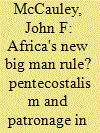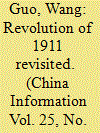|
|
|
Sort Order |
|
|
|
Items / Page
|
|
|
|
|
|
|
| Srl | Item |
| 1 |
ID:
118961


|
|
|
|
|
| Publication |
2013.
|
| Summary/Abstract |
The concept of 'big man rule', conventionally invoked to refer to a kinship-based relationship between patron and client, is now finding application in the charismatic Pentecostal movement in Africa. This article explores why new Pentecostalism emerges as an alternative to traditional clientelism, and how well the analogy of big man rule applies. It traces the Pentecostal form of big man rule to four socio-economic transformations: ongoing weakness in the state's ability to provide social welfare; a change in social values in the wake of the global financial crisis; expanding state control over customary activities; and urbanization. Drawing on data collected from both patrons and clients in Ghana, the article shows that Pentecostalism mirrors traditional big man rule by encouraging members to break from their past, to trust leadership, and to commit exclusively to their religious social network. Among church leaders, Pentecostalism also encourages internal competition and the provision of social services. Most importantly, the movement creates pay-off structures that replicate the exchange of resources for loyalty central to big man rule. The implication is that Pentecostalism's success as an alternative informal institution is not a function of Weberian ethics or occult spiritualities, but rather its ability to fill voids left by the state and to provide new social networks.
|
|
|
|
|
|
|
|
|
|
|
|
|
|
|
|
| 2 |
ID:
115999


|
|
|
| 3 |
ID:
139634


|
|
|
|
|
| Summary/Abstract |
This article examines the political economy of grand corruption in Tanzania in the era of rapid growth and global integration. Grand corruption in Tanzania is linked to intra-elite conflicts within the ruling CCM party. However, the underlying dynamics of these struggles and how such elite politics interacts with the wider process of socio-economic transformation unfolding in Tanzania are not well understood. This article draws on the political settlements approach in building an analytical framework to examine four major grand corruption scandals that occurred within public finance from 2000 until 2014. In particular, it sets out the key actors and patterns in the factional struggles over corruption in order to demonstrate how the elite within the ruling CCM party is not centralized but composed instead of internal factions that have equal weight. The article explains how the enduring control of this elite, despite its internal divisions, can be explained by examining the balance of power in society beyond the institutions of the ruling party or the state itself. The article then establishes the mechanisms through which grand corruption shapes paths of accumulation within the domestic economy in Tanzania. In concluding, it argues that the fragmented distribution of power within the ruling party means that policy responses of the donor community, in particular the halting of aid disbursements, have been ineffective and are likely to continue to be ineffective in stopping grand corruption in Tanzania.
|
|
|
|
|
|
|
|
|
|
|
|
|
|
|
|
| 4 |
ID:
110144


|
|
|
|
|
| Publication |
2011.
|
| Summary/Abstract |
Reviewing the last decade of Chinese-language scholarship on the 1911 Revolution, this article suggests that we should view the Revolution in richer ways, rather than simply focusing on the political event on 10 October 1911. By contextualizing the revolution in its world, this article argues that it is necessary to view 1911 in its own terms and in global perspective in order to articulate historical continuities and discontinuities beyond 1911. How did, does, and will the spirit of modern revolution function and reshape the mental landscape in China's past, present, and future? The revolution is considered here to be not only a transhistorical source of transformation but also part of the restructuring of social life and ideals. Revolution has become the ontological ground of China's modern society. The meaning of the spirit of revolution lay in providing the Chinese people with a space of hope, where they could transcend current disappointment and discontent, and pursue political, economic, and cultural visions to fundamentally change their world. For individuals, revolution offered a means of meeting personal needs; for the nation, the revolution has meant the unending pursuit of 'standing up, enriching up, and strengthening up'.
|
|
|
|
|
|
|
|
|
|
|
|
|
|
|
|
|
|
|
|
|